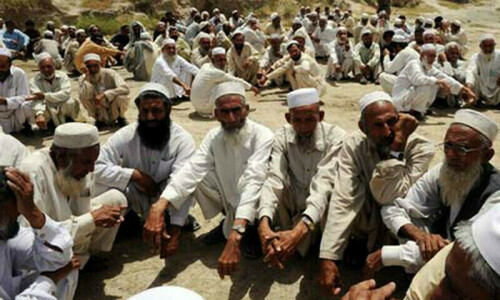MABAD: The Supreme Court has expressed concern over the state of affairs in the Khyber Pakhtunkhwa (KP) Workers Welfare Board (WWB) with an observation that the court was appalled and shocked by the way the department was functioning for the last many years.
“It presents a pathetic picture of total and complete disregard, violation and disrespect for the law, rules and regulations,” regretted a judgement authored by Justice Ijazul Ahsan.
Justice Ahsan was a member of a three-judge Supreme Court bench, headed by Chief Justice Gulzar Ahmed, which heard and decided an appeal against a March 29, 2018, verdict of the Peshawar High Court which ordered the KP-WWB to regularise the services of some of its employees. The department went into appeal against the order before the apex court.
Employees of the Polytechnic Institute, Mono Tech Institute and Matric Tech Institute working on different scales throughout KP on contractual basis had approached the PHC which issued the order.
Ruling says funds were doled out to favourites who were given appointments without due process
In its 19-page order, the Supreme Court regretted that the WWB had violated rules and regulations or amended, bypassed or ignored from time to time and even issued notifications with impunity for questionable reasons.
The court further said documents were generated to facilitate and cover up corruption, cronyism, favouritism and personal or political favours at the expense of the exchequer.
Huge amounts of funds were doled out to favourites who were given appointments without due process, without following the principles of merit, competition and transparency.
A large number of appointments were indiscriminately made without regard to or settling parameters, criteria, benchmarks, minimum qualifications and other factors, the court observed.
Appointments were made in a slipshod manner without due process of following the standard operating procedures required for appointments in public sector entities and government departments, according to the judgement.
As long as patrons remained posted on relevant positions, such employees continued to receive salaries and remained on the board’s payroll, the judgement said.
But when such patrons got displaced by reason of transfer, promotion or retirement, the successors cancelled or recalled earlier appointments with questionable motives apparently to accommodate their own cronies and favourites, the Supreme Court said.
The consequent mess led to multiplicity of litigation, resulting in a flurry of judgements rendered by different courts which at times were inconsistent and contradicted each other, the judgement added.
The Supreme Court ordered the KP government to constitute a committee, to be headed by its chief secretary.
The committee will examine the laws, rules and regulations governing the setting up, operation and functioning of the school system set up by the board.
The Workers Welfare Board will provide the committee all information, financial documents and documents related to terms and conditions of employment of the entire staff working in these schools.
The committee will have the power to constitute sub-committees for examining the entire process of employing persons in the board’s projects, especially in its schools.
It will also examine and suggest changes in the system of appointments to be made by selection boards constituted on the basis of recommendations to be made by this committee, the Supreme Court judgement said.
The committee will get conducted an independent audit of the board, with special reference to school projects for the past seven years, in order to fix responsibility for cronyism, favouritism, unnecessary litigation and leakage and wastage of funds.
The committee shall coordinate with the National Accountability Bureau (NAB) and the Anti-Corruption Establishment, charged with a responsibility to oversee and undertake accountability initiatives where public funds are utilised.
The committee shall look into the working of the board, its management committee, chairmen as well as secretaries who worked over the past seven years.
The Supreme court, while accepting the WWB’s plea, ordered undertaking the entire exercise within three months.
Published in Dawn, November 7th, 2020















































